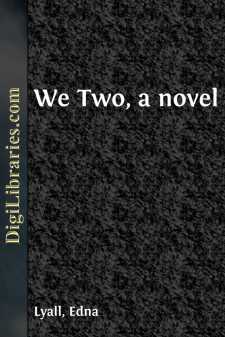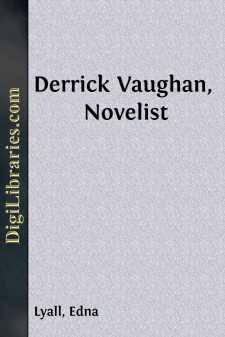Categories
- Antiques & Collectibles 13
- Architecture 36
- Art 48
- Bibles 22
- Biography & Autobiography 813
- Body, Mind & Spirit 142
- Business & Economics 28
- Children's Books 17
- Children's Fiction 14
- Computers 4
- Cooking 94
- Crafts & Hobbies 4
- Drama 346
- Education 46
- Family & Relationships 57
- Fiction 11829
- Games 19
- Gardening 17
- Health & Fitness 34
- History 1377
- House & Home 1
- Humor 147
- Juvenile Fiction 1873
- Juvenile Nonfiction 202
- Language Arts & Disciplines 88
- Law 16
- Literary Collections 686
- Literary Criticism 179
- Mathematics 13
- Medical 41
- Music 40
- Nature 179
- Non-Classifiable 1768
- Performing Arts 7
- Periodicals 1453
- Philosophy 64
- Photography 2
- Poetry 896
- Political Science 203
- Psychology 42
- Reference 154
- Religion 513
- Science 126
- Self-Help 84
- Social Science 81
- Sports & Recreation 34
- Study Aids 3
- Technology & Engineering 59
- Transportation 23
- Travel 463
- True Crime 29
We Two, a novel
by: Edna Lyall
Description:
Excerpt
CHAPTER I. Brian Falls in Love
Still humanity grows dearer,
Being learned the more. Jean Ingelow.
There are three things in this world which deserve no
quarter—Hypocrisy, Pharisaism, and Tyranny. F. Robertson
People who have been brought up in the country, or in small places where every neighbor is known by sight, are apt to think that life in a large town must lack many of the interests which they have learned to find in their more limited communities. In a somewhat bewildered way, they gaze at the shifting crowd of strange faces, and wonder whether it would be possible to feel completely at home where all the surroundings of life seem ever changing and unfamiliar.
But those who have lived long in one quarter of London, or of any other large town, know that there are in reality almost as many links between the actors of the town life-drama as between those of the country life-drama.
Silent recognitions pass between passengers who meet day after day in the same morning or evening train, on the way to or from work; the faces of omnibus conductors grow familiar; we learn to know perfectly well on what day of the week and at what hour the well-known organ-grinder will make his appearance, and in what street we shall meet the city clerk or the care-worn little daily governess on their way to office or school. It so happened that Brian Osmond, a young doctor who had not been very long settled in the Bloomsbury regions, had an engagement which took him every afternoon down Gower Street, and here many faces had grown familiar to him. He invariably met the same sallow-faced postman, the same nasal-voiced milkman, the same pompous-looking man with the bushy whiskers and the shiny black bag, on his way home from the city. But the only passenger in whom he took any interest was a certain bright-faced little girl whom he generally met just before the Montague Place crossing. He always called her his "little girl," though she was by no means little in the ordinary acceptation of the word, being at least sixteen, and rather tall for her years. But there was a sort of freshness and naivete and youthfulness about her which made him use that adjective. She usually carried a pile of books in a strap, so he conjectured that she must be coming from school, and, ever since he had first seen her, she had worn the same rough blue serge dress, and the same quaint little fur hat. In other details, however, he could never tell in the least how he should find her. She seemed to have a mood for every day. Sometimes she would be in a great hurry and would almost run past him; sometimes she would saunter along in the most unconventional way, glancing from time to time at a book or a paper; sometimes her eager face would look absolutely bewitching in its brightness; sometimes scarcely less bewitching in a consuming anxiety which seemed unnatural in one so young.
One rainy afternoon in November, Brian was as usual making his way down Gower Street, his umbrella held low to shelter him from the driving rain which seemed to come in all directions....




